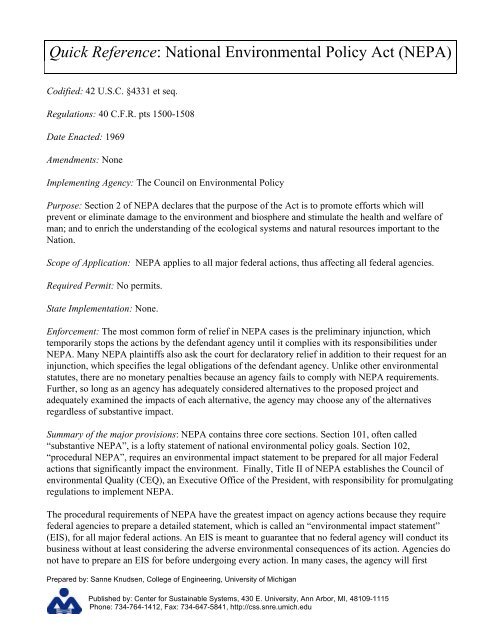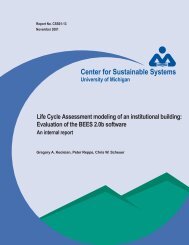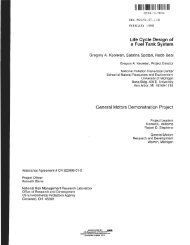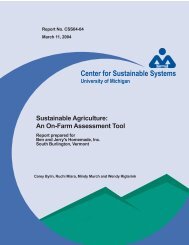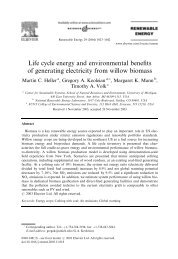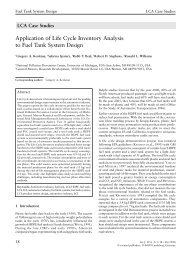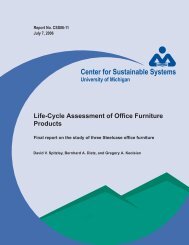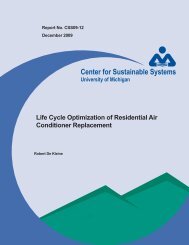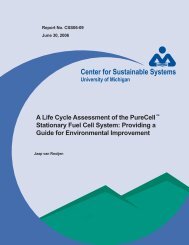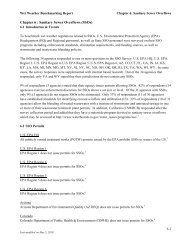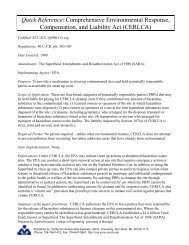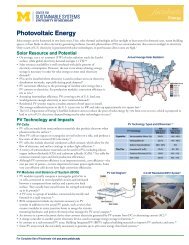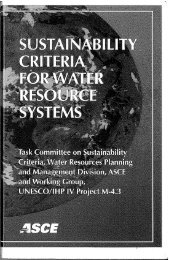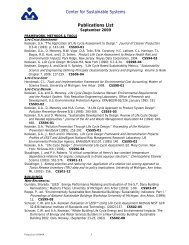National Environmental Policy Act (NEPA) - Center for Sustainable ...
National Environmental Policy Act (NEPA) - Center for Sustainable ...
National Environmental Policy Act (NEPA) - Center for Sustainable ...
You also want an ePaper? Increase the reach of your titles
YUMPU automatically turns print PDFs into web optimized ePapers that Google loves.
Quick Reference: <strong>National</strong> <strong>Environmental</strong> <strong>Policy</strong> <strong>Act</strong> (<strong>NEPA</strong>)<br />
Codified: 42 U.S.C. §4331 et seq.<br />
Regulations: 40 C.F.R. pts 1500-1508<br />
Date Enacted: 1969<br />
Amendments: None<br />
Implementing Agency: The Council on <strong>Environmental</strong> <strong>Policy</strong><br />
Purpose: Section 2 of <strong>NEPA</strong> declares that the purpose of the <strong>Act</strong> is to promote ef<strong>for</strong>ts which will<br />
prevent or eliminate damage to the environment and biosphere and stimulate the health and welfare of<br />
man; and to enrich the understanding of the ecological systems and natural resources important to the<br />
Nation.<br />
Scope of Application: <strong>NEPA</strong> applies to all major federal actions, thus affecting all federal agencies.<br />
Required Permit: No permits.<br />
State Implementation: None.<br />
En<strong>for</strong>cement: The most common <strong>for</strong>m of relief in <strong>NEPA</strong> cases is the preliminary injunction, which<br />
temporarily stops the actions by the defendant agency until it complies with its responsibilities under<br />
<strong>NEPA</strong>. Many <strong>NEPA</strong> plaintiffs also ask the court <strong>for</strong> declaratory relief in addition to their request <strong>for</strong> an<br />
injunction, which specifies the legal obligations of the defendant agency. Unlike other environmental<br />
statutes, there are no monetary penalties because an agency fails to comply with <strong>NEPA</strong> requirements.<br />
Further, so long as an agency has adequately considered alternatives to the proposed project and<br />
adequately examined the impacts of each alternative, the agency may choose any of the alternatives<br />
regardless of substantive impact.<br />
Summary of the major provisions: <strong>NEPA</strong> contains three core sections. Section 101, often called<br />
“substantive <strong>NEPA</strong>”, is a lofty statement of national environmental policy goals. Section 102,<br />
“procedural <strong>NEPA</strong>”, requires an environmental impact statement to be prepared <strong>for</strong> all major Federal<br />
actions that significantly impact the environment. Finally, Title II of <strong>NEPA</strong> establishes the Council of<br />
environmental Quality (CEQ), an Executive Office of the President, with responsibility <strong>for</strong> promulgating<br />
regulations to implement <strong>NEPA</strong>.<br />
The procedural requirements of <strong>NEPA</strong> have the greatest impact on agency actions because they require<br />
federal agencies to prepare a detailed statement, which is called an “environmental impact statement”<br />
(EIS), <strong>for</strong> all major federal actions. An EIS is meant to guarantee that no federal agency will conduct its<br />
business without at least considering the adverse environmental consequences of its action. Agencies do<br />
not have to prepare an EIS <strong>for</strong> be<strong>for</strong>e undergoing every action. In many cases, the agency will first<br />
Prepared by: Sanne Knudsen, College of Engineering, University of Michigan<br />
Published by: <strong>Center</strong> <strong>for</strong> <strong>Sustainable</strong> Systems, 430 E. University, Ann Arbor, MI, 48109-1115<br />
Phone: 734-764-1412, Fax: 734-647-5841, http://css.snre.umich.edu
prepare an <strong>Environmental</strong> Assessment (EA). If the EA indicates that the action will not significantly<br />
impact the quality of the environment, the Council on <strong>Environmental</strong> Quality issues a Finding of No<br />
Significant Impact (FONSI) and no EIS need to be prepared.<br />
Prepared by: Sanne Knudsen, College of Engineering, University of Michigan<br />
Published by: <strong>Center</strong> <strong>for</strong> <strong>Sustainable</strong> Systems, 430 E. University, Ann Arbor, MI, 48109-1115<br />
Phone: 734-764-1412, Fax: 734-647-5841, http://css.snre.umich.edu


